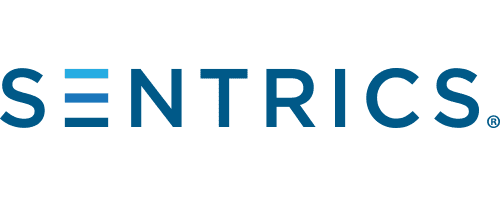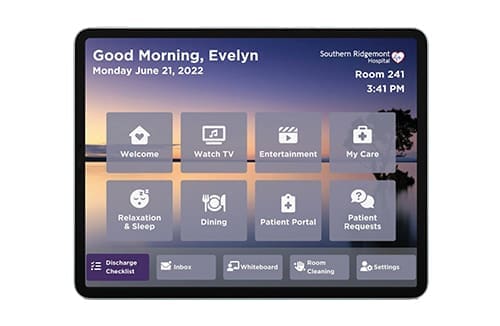Since they were first introduced on the market, iPads and other portable tablets have become standard technology in hospitals and other acute care settings. Many people were initially concerned about HIPAA violations when tablets were introduced. Healthcare apps have become more available as network security has improved, reducing those initial concerns. Today tablets are used to access pharmaceutical information, collect patient data, provide patient education about every step of the patient’s stay and procedure, and share information between hospital staff. With the increasing use of tablets in hospitals, their role has changed significantly over time.
A growing number of hospitals are offering patient engagement platforms – tablets with apps that enable patients to access their medical data, ask questions, see dining menus, watch TV or movies, view messages and hospital information, request a cleaning, complete education courses and even relax. With these cutting-edge mobile tools, hospitals have improved patient satisfaction and the quality of care they provide. Tablets are beneficial to patients, help providers make better treatment decisions, and provide long-term support to them.
It is becoming more common for hospitals to integrate tablets into patient care to balance costs and quality. There has been a significant reduction in readmissions and increase in patient satisfaction in hospitals that have implemented tablets. The Centers for Medicare & Medicaid Services can impose penalties and slash hospitals’ payments if they have excessive readmissions. Additionally, readmissions cost the US. Healthcare system more than $41 billion annually according to HCUP. While some readmissions cannot be avoided or are even planned, hospitals should do their best to reduce their number. A patient who actively participates in their own care and is engaged and satisfied with their care is less likely to be readmitted to the hospital within 30 days of discharge. A recent Patient Engagement HIT study found that patients at Community Hospital of Monterey Penisula reduced hospital readmission by up to 14 percent when they used engagement platforms.
Tablets powered by these engagement platforms help patients take an active role in their care. Via tablets, patient engagement platforms give patients quick access to all the medical information they need to know including medications, dosage, procedures, daily care schedules, test results, educational videos, identification information of physicians and nurses, expected discharge date, and discharge requirements. It is even possible for patients to grant family members or other caregivers access to their engagement platform to increase participation and their ability to support the patients through their care journey. While hospitals still control how and when patients can see information, accessing all that information at their fingertips alleviates patients’ fears.
Rather than requiring patients to “review” their care plan with their doctors, patients are able to read and digest it on their own. By making care information readily available on tablets, hospitals can reduce confusion and improve care. The alignment of patient goals and their care plan reduces patient frustration, increases patient satisfaction, and reduces healthcare costs.
As a result of the tablets’ simplicity and ease of use, patients become more engaged throughout their stay. Patients can control things like room temperature, lighting, pillow speaker controls, and shade adjustments. They will be less likely to need to contact your hospital for assistance, which alleviates pressure on your staff. In addition, patients can select from various streaming apps, local television channels, or even download their favorite movies. Providing patients with more control increases patient satisfaction and reduces the non-clinical workload of your nurses.
With a little customization, the tablets can be tailored to your hospital’s needs. One of the most innovative programs is the newly designed Sentrics E3 platform for iPad. Three pillars of Sentrics E3 transform the patient experience:
- Control – E3 gives patients control over their hospital experience
- Communication – E3 puts patients at the center of their health care with personalized health information and two-way communication between patients and nurses
- Clinical efficiency – E3 integrations automate routine tasks and streamline workflows that reduce non-clinical nurse interruptions and improve care quality.
A variety of tools are included in each pillar, including health education programming, in-room entertainment, room-comfort controls, and real-time patient feedback tools, all accessible via an in-room, smart TV, as well as a redesigned interface for iPads and tablets. Major software updates, which are available now, include an integrated digital whiteboard on the patient TV, which keeps patients updated without the need for a nurse or aide to use personal protective equipment to physically enter the room, sanitize a board and write an update; My Health Record, which integrates with the hospital EMR to give the patient access from their TV to test results, medication summaries and clinical notes; and integration with Coro Health’s MusicFirst solution, which offers scientifically curated music to improve patient rest, healing and wellbeing.
At Sentrics, we know listening to patients’ voices is one of the most powerful catalysts for improving care. That’s why we took the extraordinary step to create the E3 Patient and Family Advisory Council (PFAC) to bring patient voice into every aspect of our product development. Sentrics E3 is the only PFAC-certified interactive technology on the market, giving hospitals confidence.
Throughout the hospital stay and post-acute care recovery process, Sentrics E3 puts the patient in the center of the care experience. The interactive, engagement platform puts patients in control of room comfort, delivers personalized, integrated communications and drives clinical efficiencies to improve care quality. Patient tested. Patient approved.
Looking for more ways to more fully engage with your patients? Learn how Sentrics E3 Patient Experience Platform is helping to better educate and engage patients HERE. Or contact us today right HERE or call (888) 988-8210



